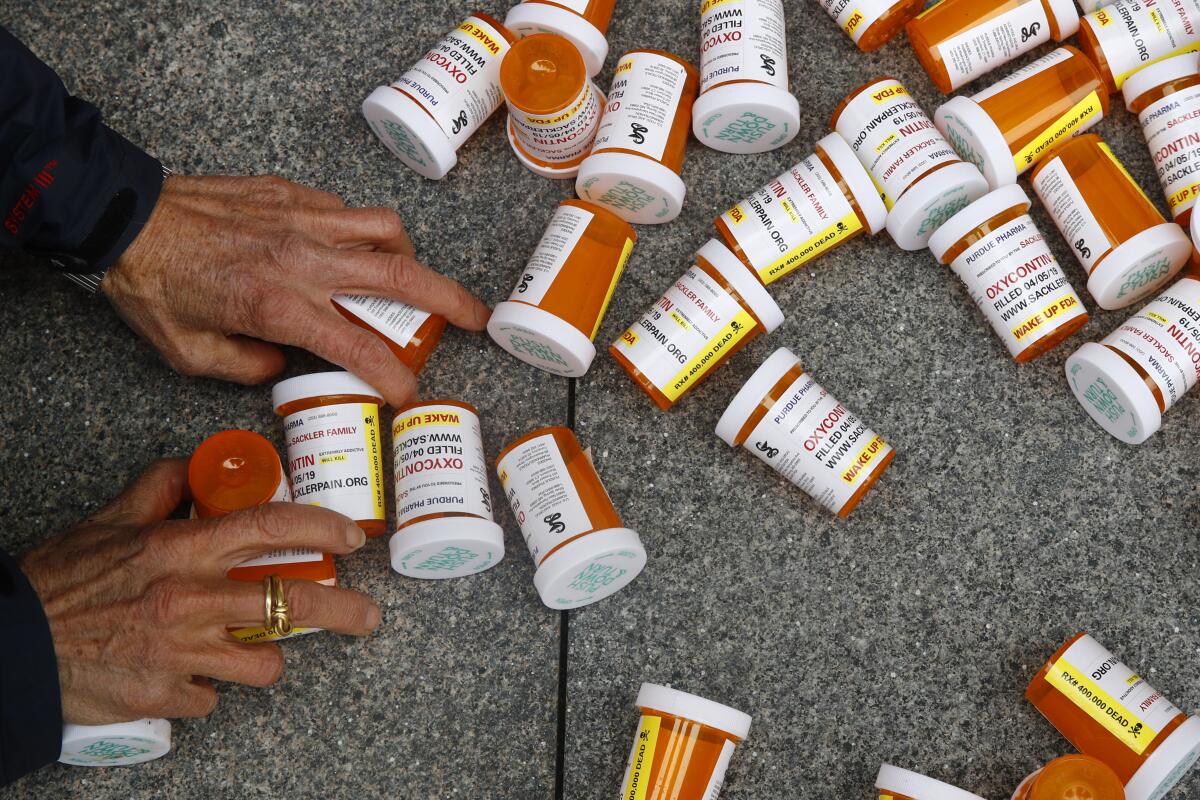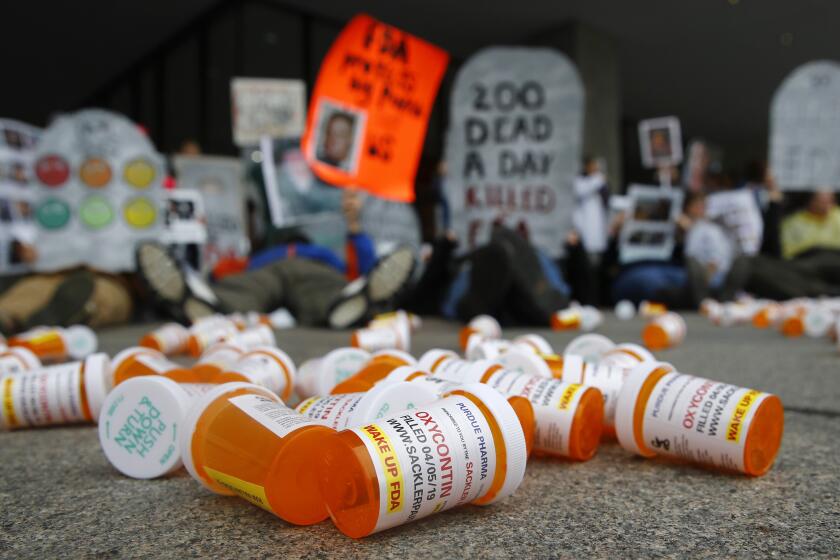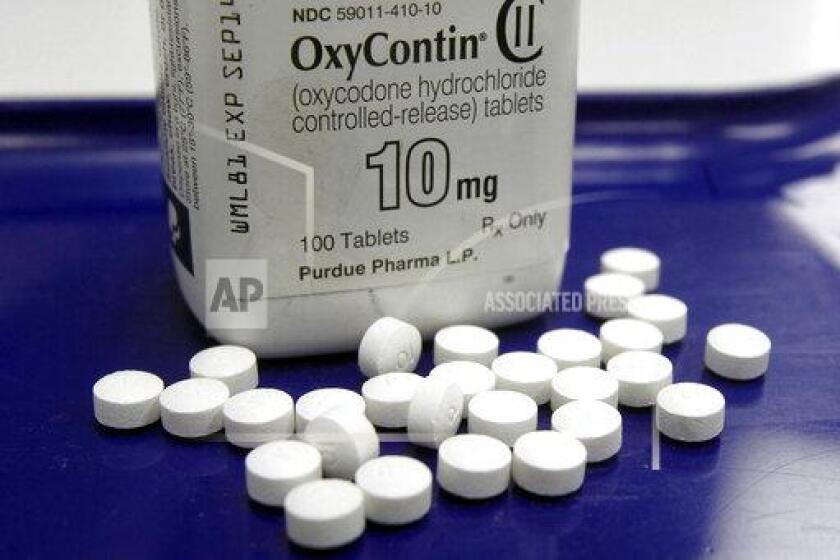Orange County judge rules in favor of drugmakers in California opioid crisis lawsuit

- Share via
An Orange County judge has found in favor of top drugmakers in a lawsuit brought by California counties that blamed the companies for the nation’s opioid crisis and sought funds to cover the costs of dealing with it.
Superior Court Judge Peter Wilson issued a tentative ruling Monday saying the county governments hadn’t proved that the pharmaceutical companies used deceptive marketing to increase unnecessary opioid prescriptions and create a public nuisance.
“There is simply no evidence to show that the rise in prescriptions was not the result of the medically appropriate provision of pain medications to patients in need,” Wilson wrote in a ruling of more than 40 pages.
“Any adverse downstream consequences flowing from medically appropriate prescriptions cannot constitute an actionable public nuisance,” the ruling said.
Los Angeles, Orange and Santa Clara counties and the city of Oakland argued that the drug manufacturers misled both doctors and patients by downplaying the risks of addiction, overdose, death and other health complications while overstating the benefits for long-term health conditions.
The plaintiffs said they were disappointed by the ruling but planned to appeal to “ensure no opioid manufacturer can engage in reckless corporate practices that compromise public health in the state for their own profit.”
As deplorably as Sackler family members are alleged to have behaved, this epidemic was too complex for one group to have created.
The lawsuit names Johnson & Johnson, AbbVie’s Allergan subsidiary, Endo International, Teva Pharmaceutical Industries and others.
The companies had argued in court filings “that opioid medications are an appropriate treatment for many chronic-pain patients” and that much of their marketing mimicked approved warnings by the U.S. Food and Drug Administration.
Historically, the local jurisdictions say, the powerful drugs had been used only immediately after surgeries or for other acute, short-term pain, or for cancer or palliative care.
The drugmakers “successfully transformed the way doctors treat chronic pain, opening the floodgates of opioid prescribing and use,” the lawsuit contended. “This explosion in opioid prescriptions and use has padded Defendants’ profit margins at the expense of chronic pain patients.”
As the opioid epidemic continues to claim lives, UC Irvine researchers have identified the extract of the plant Corydalis yanhusuo that may help fight opiate addiction.
The federal government says nearly half a million Americans have died from opioid abuse since 2001.
All sides have acknowledged that there is an opioid epidemic.
Wilson said drug-abuse hospitalizations and overdose deaths “starkly demonstrate the enormity of the ongoing problem.”
In a statement, Johnson & Johnson called the crisis “a tremendously complex public health issue” but said the judge’s decision showed that it had engaged in “appropriate and responsible” marketing of its prescription painkillers.
Sam Quinones, author of ‘The Least of Us,’ a followup to his prophetic addiction chronicle ‘Dreamland,’ talks about meth, homelessness and defiant hope.
Endo International said that the decision was a “thorough and thoughtful” one following months of testimony and that the company’s “lawful conduct did not cause the widespread public nuisance at issue” in the lawsuit.
Teva said that it was pleased with the ruling and that “a clear win for the many patients in the U.S. who suffer from opioid addiction will only come when comprehensive settlements are finalized and resources are made available to all who need them.”
The plaintiffs projected that, based on experts’ estimates, it could cost $50 billion to provide comprehensive opioid-abatement programs in the four jurisdictions that filed the lawsuit. The money would go for things like ongoing opioid-abuse prevention and treatment programs in L.A. and Santa Clara counties.
The California case was the first such U.S. lawsuit when it was filed in 2014, prosecutors said at the time. But thousands of similar lawsuits have since been filed nationwide by cities, counties and states.
It was just the second such case to go to trial, after an Oklahoma judge ordered Johnson & Johnson to pay $465 million in 2019. The company is appealing that decision.
A similar trial is underway in federal court in West Virginia, where local governments sued the nation’s three biggest drug-distribution companies: AmerisourceBergen Drug, Cardinal Health and McKesson Corp. Other lawsuits have resulted in massive settlements or proposed settlements.
In July, those three companies and Johnson & Johnson were in the final stages of negotiating a $26-billion settlement covering thousands of government lawsuits, though it could take months to get final approval from state and local governments.
New York state separately has a $1-billion-plus deal involving the three drug distributors. But it is going to trial against Teva Pharmaceutical Industries, Endo International and AbbVie, which are defendants in the California case.
Without admitting wrongdoing, Johnson & Johnson previously settled with New York for $230 million before a trial started there against manufacturers, regional distribution companies and pharmacies. Johnson & Johnson has said it is prepared to contribute up to $5 billion to a national settlement.
The deals did not stop the trials in West Virginia and California. The weeks-long California trial started April 19.
More to Read
Sign up for Essential California
The most important California stories and recommendations in your inbox every morning.
You may occasionally receive promotional content from the Los Angeles Times.













